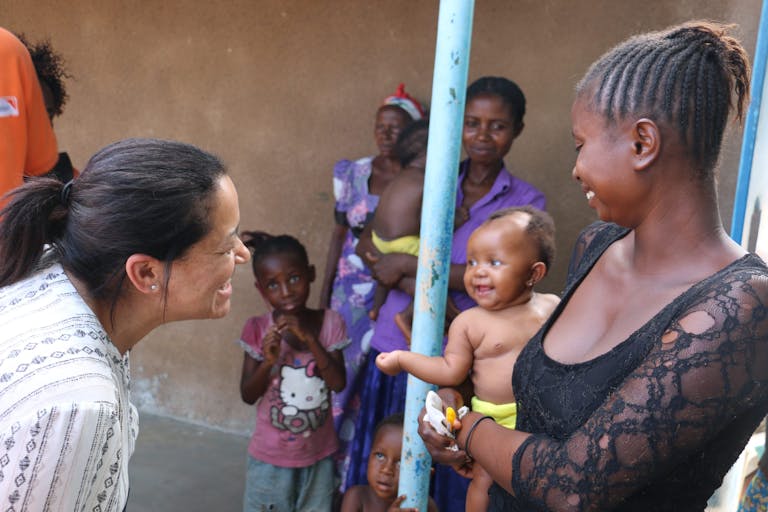As part of our Americans in the UN project to share the stories of Americans who work for the United Nations, we connected with Valerie Guarnieri, the Assistant Executive Director of the UN World Food Programme (WFP).
In this role, she leads cutting-edge program and policy development aimed at ending hunger and heading WFP efforts to ensure protection and inclusion, expand school meals and nutrition programs, empower women, build resilient food systems, and support cash transfers and social protection.
Originally from Vienna, Virginia, she earned a bachelor’s degree at George Mason University and her master’s at the American University.
Where are you from originally and where did you go to school?
Valerie Guarnieri: I grew up mostly in South/Southeast Asia — the Philippines, Hong Kong, and Indonesia for grades 4-9, and Kodaikanal, a small hill station in southern India where I graduated from boarding school. Home is also the house in Vienna, Virginia, that my family lived in for two years before moving to Indonesia and where my parents retired to and lived until they died. Some of my mom’s ashes are buried under the cherry tree in the front yard and the rest are with my dad at Arlington National Cemetery. He served in the U.S. Army and they met in France, where mom is from. We kept our residency in Virginia while we were abroad and I did my undergraduate studies at George Mason University in Fairfax, Virginia, and got my master’s at the American University in Washington.
How do you describe your job to your friends and family at home?
VG:I tell everyone I have the best job in the world: feeding hungry people and reaching those furthest behind. Food is such a basic need that everyone can relate to the importance of making sure people have enough food to eat. My family and friends are obsessed with cooking and eating, and so many of my happy memories involve talking and laughing over a meal. I love that WFP helps bring the connection that comes from a family meal to people around the world, including those caught up in conflict and other crises.

How did you first learn about the UN?
VG: My first direct experience with the UN came when I was working with USAID [the United States Agency for International Development], managing an airlift into Somalia. I was just 24, and our small team was coordinating deliveries of food and supplies by the U.S. military for WFP, the International Committee of the Red Cross, and a couple of NGOs [nongovernmental organizations]. It was a desperate situation, with dozens of people dying each day in southern Somalia. While U.S. military was flying in and out, the brave UN and NGO workers stayed behind to make sure essential food, medicine, clean water, and sanitation services reached those who needed it most. I knew then and there that I wanted to be part of an organization like WFP and was thrilled when I got the chance eight years later.
What is your message to Americans about the importance of the UN?
VG: Today’s world is more connected than ever, as the COVID-19 pandemic has shown us, and we need a place to tackle our common problems and find shared solutions. That’s the UN. Its role is irreplaceable, and so, too, is the U.S. leadership role within the UN.
Where around the world have you worked for WFP?
VG: I joined WFP at our headquarters in Rome in 2000 and keep coming back — this is my third time based in Rome. Zimbabwe was my first WFP field assignment. I spent two years there at a time when drought and a botched land reform effort had transformed the country from “bread basket” to “basket case,” and we scaled up to deliver food to over 5 million people. As Country Director, I also started up a new operation for WFP in the Philippines, addressing hunger and supporting peace in the troubled Mindanao region. More recently, I was Regional Director in East and Central Africa, based in Kenya and overseeing some of WFP’s most complex operations in Ethiopia, Somalia, South Sudan, Uganda, and more.
What motivates you to work for the UN?
VG: The chance to connect with people and make a difference in their lives! Whenever I travel to the field I am inspired by the resilience of the people we serve, particularly the women. They are so strong and beautiful and determined to make a better future for their children and themselves, despite recurring shocks. It makes me want to do more and do better to support them.
From your experience, what is an example of how the UN has made a difference in someone’s life?
VG: Ensuring school feeding for children is one of my favorite programs. With only 25 cents per day, WFP provides a nutritious meal at school, increasing enrollment, attendance, and learning outcomes. By targeting girls and linking nutritious meals with reproductive health and psychosocial support, we can also reduce dropouts, early marriages, and teen pregnancy, as I saw in Malawi recently, visiting a girl’s education program that WFP, UNICEF [the United Nations Children’s Fund], and UNFPA [the United Nations Population Fund] jointly manage. And when we source food from local farmers, we can better engage the community, provide fresh, nutritious food, and invest in local economies.
What is your favorite part of the job?
VG: The people I work with, who are like family, and the people we serve. Their strength and resilience inspire me to work harder.
What has been your proudest moment?
VG: It’s hard to beat the Nobel Peace Prize. It was such an amazing tribute to our humanitarian heroes, past and present. COVID-19 hasn’t really allowed us to celebrate the way we deserve to, but hopefully we will still have that chance. Meanwhile, there is so much work to do.
Featured Photo: WFP



 View All Blog Posts
View All Blog Posts